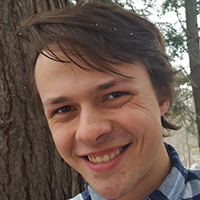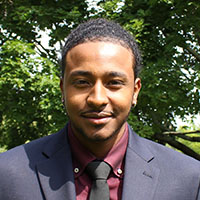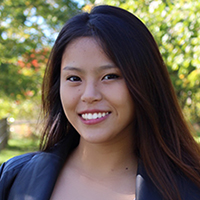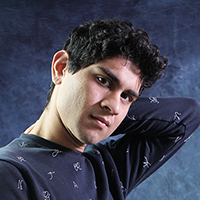
Caleb McCarroll-Butler
Majors: Environmental Science and Conservation & Biodiversity
What factors contributed to you choosing your program(s)?
I have always had a sort of subconscious quest in life to learn as much I can about the astonishing natural world upon which we all rely. When I was 7 to 10 or so, I would read atlases early on Saturday mornings instead of watching cartoons like the other kids. I have always had the urge to understand what makes the world tick and how its living and nonliving aspects interact. I tend to describe my programs as two sides of the same coin for this reason: Conservation and Biodiversity tends to operate at the levels of ecological communities and is enormously effected by environmental happenings (be they climactic, geological, hydrological, etc.) both ecologically and evolutionarily, and environmental science informs how this happenings occur. It's really, really cool.
Can you describe your program(s)? What is it actually like?
Since my two majors are in two different departments, there are very few classes that overlap between them after first year. Only one mandatory one (second year ecology), and two elective (third year environmental microbiology and fourth year site remediation). For this reason, there are a whole lot of courses to take and not a huge amount of space for other, non-biology or environmental science courses. Despite this, there is a lot of flexibility within the programs themselves ("pick at least two of the following twelve courses" for example) so the learning within the fields can be very self-directed and therefore fairly personalised and interesting. The classes range hugely in workload, but nothing is even close to unmanageable if your time management skills are reasonably alright. As the years go on, the courses get more and more specialised and thus more and more interesting for the students. You'll find yourself wishing it were realistic to take more than five or six courses in a semester.
What tips/advice can you provide to students just starting or considering this program(s)?
- LOVE IT. It makes such a difference, in terms of grades, information retention, ease of studying, enjoyment, etc. when you are personally invested in your own learning about the subject matter. You have choices, so take the courses that you feel will benefit you. Yes grades are important, but what is so much more important is your actual learning from the courses.
- DON'T JUST BE A FACE IN THE CROWD. When the vast majority of professors say "come to my office hours," they mean it! They are invested in your learning and are so incredibly knowledgeable about their field. Talking to the profs, asking questions, and answering questions could drastically improve both your success and your investment in the subject matter.
- TAKE ADVANTAGE OF COOL CLASSES. These majors are unique because, since they are based upon the natural world, they both offer field courses and undergraduate research opportunities. From nearby ecological activity to studying fissure volcanoes in Iceland to studying birds in the tropics, you have an opportunity to gain field experience and see what you've been learning about in real life.
What will you do with your degree after graduation?
Most people in my majors are interested in conservation work with the government, environmental consulting, environmental law, or research (either for the government or privately). While these are all excellent and necessary fields for people with my skill set and academic history, I intend to go to teacher's college after getting a master's degree in atmospheric science, environmental science, or ecology and evolutionary biology. I would then apply to be a high school biology and/or general science teacher, if all goes according to plan. I love learning and I love sharing knowledge so this future path is perfect for my approach to the ever important knowledge and ideas presented in this degree.
What has your academic journey during your time been like as you progress toward graduation?
FIRST YEAR: Originally, I was accepted into the specialist in environmental geoscience program. While this is still incredibly interesting to me and I still take as many geoscience courses as possible, I discovered during first year that the broader my education is within the realm of science, the happier and more invested I will be. It was a general science first year, with two sections each of calculus, bio, chem, and environmental science with physics in first semester. I found most of first year to be ensuring everybody is on an even playing field for future years. As such, most of it was review for me. On top of these science courses, I also joined the UTSC choir and have been leader of the tenor section since second semester of first year. Don't forget to make room for what you love in your degree.
SECOND YEAR: Generally, second year courses in both of these programs go deeper into concepts covered in their first year equivalent. For example cell bio, molecular bio, evolutionary bio, ecology, animal physiology, and plant physiology are a separate courses now instead of being different modules of the umbrella of "bio". This was a lot more work but far more interesting and enjoyable. I also took a lab course and I strongly recommend you do the same. In environmental science, second year is when I found my love of climatology and decided that atmospheric science would be my top choice for a master's degree. I recommend that you think about the future in passing as much as possible. This way you won't get stressed about it but it won't come as a surprise when it arrives. Being an obsessive planner, I also had the remainder of my university career planned by the end of second year (which continues to be edited).
THIRD YEAR: So far, this has been my favourite year by far (and I can only expect next year to be better). The courses are unfailingly interesting because they are specific and the profs are teaching what they love to teach. I have found, after first semester, that my third year marks are my highest ever just because of how much I love the courses. If you love your courses, the increasing workload won't vex you because doing the work brings you excitement a
nd joy. I know that's how it's worked for me. Best of luck in your endeavours!

Gabriel Shifferaw
Majors: Environmental Studies & Environmental Science
What factors contributed to you choosing your program(s)?
Passion for the environment. Peace & Harmony
Can you describe your program(s)? What is it actually like?
Environmental Studies is a program that attempts to tackle detrimental environmental issues in order to force society towards a more equitable and sustainable future. Environmental studies is holistic program because it integrates many different disciplines including the hardcore sciences (chemistry, biology, physics) and social sciences (including politics, law and human psychology.) Being part of the environmental studies program is an amazing experience in many different ways. For one, UTSC provides direct knowledge about the environment along with access to our own professors who are expert scientists. This allows students to actively participate in environmental assessments and to engage in professional trainings and discussions with the leading experts in our field. Additionally, as a student of Environment Studies you also undergo environmental application where we put all the course work into use in a final project with organizations that are making a difference in the environment. I had an amazing experience working with the Government of New Brunswick and WWF Canada in my senior year.
What tips/advice can you provide to students just starting or considering this program(s)?
- Follow your passions
- Ask a lot of questions
- Open your mind to the world and all it's complexity.
What will you do with your degree after graduation?
Finding ways for the environment, people and money to work in harmony with one another. I currently work with the City of Toronto under the Youth Cabinet working to promote environmental harmony in our city.
What has your academic journey during your time been like as you progress toward graduation?
It was a long journey before I arrived at this program. I initially enrolled at UTSC for Health Sciences then later switched to Biochemistry, which I hated with a passion. I later switched into Psychology and lastly Economics. In the middle of my third year, just as confused as I was in my first year, I took a intro class to environmental studies and I loved it, and that's what my program became. 4th year I was able to utilize a majority of my courses to complete my environmental science program and I took a 5th year to conclude my Environmental Studies program. In my fifth year I was able to do the senior year capstone course with Jim MacLellan, which I highly recommend.

Arika Hisatsune
Majors: Environmental Science and BiochemistryMinor: Biology
What factors contributed to you choosing your program(s)?
Since I received an acceptance letter, I always wanted to go for biochemistry specialist. That was my one and only goal. However, after attending my first year of university here, my vision changed. I choose these programs because I wanted to learn more of environmental science after taking first year courses and not only biochemistry. Biochemistry program offers me a deep understanding and application of expensive techniques in class and in labs that will allow me to stand out the most amongst other applicants for the future graduate studies. In labs, TAs are more helpful and you get to hear about their study or research as well, which gives me an idea of what I should expect in my further study. Also, in the environmental science program, professors will tell you about their research studies as well and are really motivated that you get to learn more than what is written on the textbook. Hearing about professionals' research daily, you will not only get to acquire extra knowledge that other students probably won't have, but also, you sometime get to see the actual instrument and learn about them in depth, which you will need to know for your graduate studies. These two major programs are going to offer me a deep understanding of ‘life' around myself and I knew these programs would make me an overall well rounded applicant for graduate school, especially with multidisciplinary courses required for those majors.
Can you describe your program(s)? What is it actually like?
Being a part of this program has taught me how to overcome my weaknesses and apply critical-thinking skills to actual workplace challenges or to real life situations. The highlights of these programs are that you will get to pick classes that you are most interested in as there will be a lot of options offered for you to pick from, to complete the degree. Also, as the level of the course proceeds, you get to learn, for example water, in more depth taught by professors that specialize in that field so you get to learn things others won't know.
What tips/advice can you provide to students just starting or considering this program(s)?
- Visit the office hours of your professors or anyone who you know works in your program area. They will tell you of their experiences and their research in depth. Sometimes they allow you to assist in some of their research projects as well. Making connection with professors could allow you to have more potential to work in a department or company and gain valuable work experience. Those experiences could make you outstanding amongst others applying to the same graduate study programs and also, you will have a clearer vision on what you will be working on if you are really going to pursue that field.
- Put effort in studying. People might laugh at you for studying all the time, or call you a nerd, but don't mind them. If you have friends in other schools, they might make you feel a little depressed that you have to work much harder than they do to get a good grade since our school requires you to work hard and put in much effort into everything. However, you will gain more experience and knowledge out of those efforts which is a good thing! Keep believing in yourself and never give up and keep putting the effort into studying. Your time will come when it is right.
- Get involved with school and meet new people. Meeting people will allow you to have a better connection but also, learn more perspectives. Perspective in any field are important and it won't hurt to learn and know about more perspectives. Getting involved will allow you to have a better resume as well and I use meeting times as my break from studying. Take advantage of the many resources on campus. There are many opportunities you could jump onto at any time!
What will you do with your degree after graduation? (Future plans?)
The degree I earn will allow me to get involved in many fields in environmental science and also biochemistry, but my goal is to be a researcher in either of these fields. The degree will allow me to enrol into a grad school that offers a high education, which will allow me to be a better researcher or technician. Being a great researcher or technician will allow you to make a positive change to yourself but also to the greater society.
What has your academic journey during your time been like as you progress toward graduation?
First year was a rough year, and I'm not going to lie about it. I am sure that a lot of you had the same experience as I did and are scared of the next year or so, but do not worry, your upper years will be better. First year for me was really rough, I am an international student and being away from home by myself was tough but also, the school workload was way more than I expected. Chemistry and biology were not that bad, however, physics was really terrible such that I had to study everyday every minute yet my result did not come out as I wanted. I had friends who never studied but got a perfect mark on midterm or final, and I envied them. However, I did not have any problems with finding or making friends because I went out for residence events and was a member of intramural soccer team on campus. It was not easy for me to go tryout on the first day by myself, but I am glad that I did it because I made a lot of friends there and upper years on my team helped me get through a rough year. These activities helped me through the transition from high school to university. In second year, I learnt what I learnt in first year in more depth. I also got involved with school, went to office hours and I had to manage my time wisely and sometimes, I felt a little overwhelmed, but I made a lot of connections here that helped. I adapted my study habit from first year enough that in second year, I was on my butt all day and studying for my classes. My grades were great, and I regained confidence in myself. I am currently in my third year and I now have a great connections with my professors from last year that I go to their office hours, even though they are not currently my professors, to talk about topics that were brought up in my class or something that pops up in my head. It has not been a smooth nice path, but it definitely grew me as a person and I have learned lessons that I can apply to in the future.

Justin Chander
Major: Environmental Science Co-op and Physical & Human Geography
Minors: Biology
What factors contributed to you choosing your program(s)?
I have always been interested in Biology and started out with a Biology major and from that I built on it with an Environmental Science major. In high school, during my last year, my school had the privilege of having a Sustainability course. That got me really interested in environmental sciences as it was further brought to my attention that the environment is an issue that transcends generations and is very pressing for the human race to address as right now humanity is having a significantly negative impact on it. Spending more time working towards completing my undergraduate degree led me to be more interested in international relations and doing to the best to better the world at a global scale as evenly as possible. Thus, I took on the Physical & Human Geography major since I had taken many environmental science courses which were also a portion of this major and begun taking the many human geography courses required for it. Then I swapped my Biology major for a minor since I had enough credits for one. Throughout my undergraduate degree, I have been in the co-op program which I entered when I entered university, which through my hard work in the co-op program, with the resources the co-op provides, I have been able to secure placement and have had working experience working in internships in various locations, such as the provincial government and potentially, private industry as well. This has been great in getting me full-time working experience during my undergraduate degree.
Can you describe your program(s)? What is it actually like?
This program is great because it allows you to explore the many environmental aspects in environmental science, such as hydrology, climatology, biodiversity; the list is endless. In the human geography part of it, you get to explore the interrelations between places, spaces, and people. It’s very interesting and it shows how everything is in fact connected. For my major that is co-op, you look for three work terms to fulfill the co-op portion of that major and these placements can come from a wide variety of companies; public, private, and everything in-between. Another fantastic thing about this program is that you really get to understand the workings of the city and the environment at many scales, locally, nationally, and globally. This is really of importance when going into a future career and beyond this, and continually increases your understandings of how the world operates. There are many options in terms of how the curriculum is since both environmental science and human geography are vast; there are many options including physical, social, and theoretical, or a combination of the above.
What tips/advice can you provide to students just starting or considering this program(s)?
- Try as many new experiences as possible. Try joining as many clubs as you can. There are many great options available to be a part of it. Also, volunteering is another great opportunity to get some experience related to your field before actually starting a paid job. There are also many options for work-study positions that one can be a part of and/or jobs, such as on campus or off-campus, that one can find potentially transferrable skills to their program. One can apply to many of them on the University of Toronto Career Learning Network.
- It’s important to connect with many people smartly. In any program, in the beginning, it’s important to connect with as many people as you can; however, as you move along, it’s important to invest time in the connections which you will feel are the most mutually beneficial. You never know where you will make these connections: your classes, your work, your volunteering, your friends, your friends of friends, etc. However, keep an open mind, but play it increasingly smarter with time.
- Organize your time as best possible. One thing I have that helps me a lot is a calendar to mark down important due dates, events, meetings, etc. This helps a lot because it keeps how you plan things in perspective. It’s important to follow these guidelines; however, it’s also important to be flexible. Often times, things don’t go exactly as planned, so it’s important to be able to be flexible to these plans and modify them accordingly and using a calendar, to help you do this, is important. This is why organization and reorganization are both key skills to this.
What will you do with your degree after graduation? (Future plans?)
For the first academic year, I focused on a broad range of the sciences: biology, chemistry, physics, and introduction to human geography. A strong high school background in any or all of these subjects will assist you with making these courses as easy as possible and, in turn, you should have a smoother transition from high school to university. In second year, your courses will start involving a lot of newer information for you. This will be more interesting. You will get into specifics of biology and environmental science such as ecology or physiology, and in human geography, you will get into more specifics like sociology and urban development. Third year is where the courses get much more interesting. You start getting involved with topics that are most relevant to what you’re studying. You explore pertinent issues like climate challenge and infrastructure problems in building cities around the world and begin to start exploring solutions to these problems. Fourth year has you critically analyzing the issues in the topics you looked at in third year, but to an even greater degree. It also has you exploring potential viable solutions for these. It also is a great segway to how graduate studies will be if that route is right for you in the future. In addition, you will have co-op work terms in-between several years; they could be at almost any point in your undergraduate years; so those give you some real-life hands-on experience working in a job that you might-well-be be working in in the near future after you are finished with this journey.
What has your academic journey during your time been like as you progress toward graduation?
Although flexible, like I said before, my future plans include working in an NGO abroad and then teaching English abroad and traveling abroad. I would like to go back to Asia for a little while and spend some time and help there and develop myself further by garnering even more new experiences. You learn the most by having a large variety of experiences and this is something that I strongly believe in, so it’s important to be as open to them as much as possible, which is what I do. Doing this allows you the most growth in your life as you are continually growing. Around two years after I graduate, I would like to go back to school and do my Master’s degree in Human Geography, somewhere in North America, likely Canada. Following that, I would like to get into any or all of the following kinds of professions: city planning, international development organizations, and global welfare organizations. However, there are many possibilities, so it might actually be something related. Honestly, you never know what you might get into, so it’s important to keep an open mind to it. The future’s possibilities are limitless so go out and seize what you would like the most in life, but be open to the idea of that changing with time because it will evolve and one of the biggest things in life is navigating your passions for yourself.~